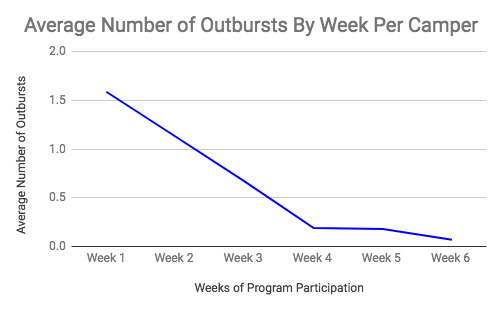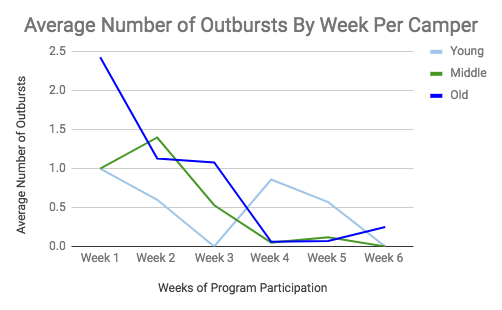One common goal among the majority of Quest campers is to improve social skills, and many formal and informal activities and interventions to promote social interactions among all campers occur throughout the day. A probe evaluation was conducted during the 2017 Summer session to explore the impact of the Quest therapeutic program model on increasing campers’ social skills, which examined the frequency of the following behaviors for the duration of the six weeks of day camp: Reciprocal Conversation and Emotion Regulation.
The first behavior of engaging in reciprocal conversation with peers was identified as an objective way to evaluate campers’ social participation with peers with a focus on the frequency of campers starting a conversation or responding back when a peer had made a statement. The second behavior of emotion regulation was identified as an objective way to evaluate campers’ ability to appropriately manage their emotions during social situations. Any increase over time in reciprocal conversation or emotion regulation would be interpreted as support that the Quest program model is effective in improving campers’ social skills.
Subjects:
Children attending Quest Camp are divided into three smaller camps based on age. Campers age 5- to 7-years-old are in the younger camp, campers 8- to 10-years-old are in the middle camp, and campers 11- to 18-years-old are in the older camp. Children over the age of 11 years are in the older camp. A total of 51 campers (7 from the younger camp, 23 campers from the middle camp, and 21 campers from the older camp) were included in the program evaluation. Campers who were both new and returners to Quest Camp and who attended for at least three consecutive weeks were included. Because the campers started attending at various times during the seven-week summer session, each camper’s first week of attendance was identified as “Week 1” and this result was considered to be each camper’s baseline value. Week 7 was not included in the study since this was a residential week and not all of the individuals who collected data were able to travel. Thus, only the first six weeks of day camp were examined.
Method:
Definition of Behaviors
Reciprocal conversation behavior was defined as any time a camper engaged in two or more exchanges with another child in which the camper effectively began a conversation and/or responded to a statement from a peer. This definition was chosen to include sufficient back-and-forth conversational exchanges to represent aspects of reciprocity with sufficient volume of voice so that the other child was able to hear them, detect a response from the listener, and continue the exchange with another statement. It was also chosen to exclude observational comments that did not identify a specific listener or lead to a reciprocal exchange from the listener. This was measured by observing speech behavior from the subject camper, followed by speech behavior by adjacent camper, and then another incident of speech behavior by the subject camper.
Emotion Regulation was defined as any time a camper either engaged in a coping skill or did not show outward signs of distress. This definition was chosen so that information about the type of coping skill that was observed, the amount of coping skills that were observed, topographies observed while having an outburst, the length of time that the outburst occurred could be included. This was measured by observing coping behaviors and outburst behaviors from the camper.
Data Collection
Data for reciprocal conversation was collected during morning game time and lunch periods. Data was collected in 5-minute observation periods using partial interval data in 30-second intervals. Efforts were made to collect data on each camper during both time periods (game time and lunch) each week.
During game time, counselors set up a variety of choices that changed daily, and included a variety of board games, Legos, and art stations. Campers were directed to join a game or activity with at least one peer. At lunchtime, all campers ate lunch in the same general area. Sheets and large towels were provided for the campers to sit upon, which encouraged camper groupings of two to four campers for young camp and two to six campers for middle and older camp. All of the campers sat near their group counselors. This facilitated social interaction among the campers while allowing the counselors to observe the campers for supervision and safety.
Any incidence of the targeted behavior that occurred during each five-minute interval was documented with a “+” on the data sheet, and any criteria for the targeted behavior that was not met was documented with a “-” or a “0.” The number of successful reciprocal conversation behavior were tallied for each camper per week, and this number was used to calculate the average percentage of occurrence for each group of campers per week.
Data for emotion regulation behavior was collected from 9am to 12:30pm. Data was collected for the duration of a campers outburst behavior and/or for the duration a campers coping skill behavior. Data was taken on any camper that had an occurrence of an emotion regulation behavior each week.
Any incidence of the observed behavior that occurred during the duration of coping skills or outburst behavior was documented with a “+” on the data sheet, and any criteria that was not observed was documented with a “-” or a “0.” The number of successful coping skills behavior, the number of outburst behavior occurred, and the number of topographies observed during outburst behavior or coping skills behavior was talled for each group per week and this number was used to calculate the average percentage of occurrence for each group per week.
The campers who were observed in the program evaluation were not aware that their specific behavior was being monitored. Observations were conducted from a distance and perspective that allowed the observer to know when the camper was speaking and to hear what was actually said by the camper. This was intentional to reduce a possible reactivity effect on the outcome of the study.
Interrater Reliability
To facilitate data collection, a BCBA-D, three individuals who were being supervised for BCBA certification, and one MFTI participated in collection of reciprocal conversation. These individuals were trained regarding the definition of reciprocal conversation behavior and simultaneous data collection occurred until an interrater reliability level of 80% was established. Staff members (camp counselors) participated in collection of reciprocal conversation. These individuals were trained regarding the definition of emotion regulation behavior and in emotion regulation data collection. They were given additional support through camp while taking this data but were not trained or tracked for interrater reliability. Confidentiality of the campers was maintained by using first names on data sheets, and all observers signed confidentiality agreements prior to participation.
Analysis of Data
There was variation among the start date of the campers within the six-week summer program. To calculate the weekly average values, data from each camper’s first week of attendance was grouped, data from each camper’s second week was grouped, and so on, regardless of the camper’s actual start date.
Results:
The average percentage of occurrence of reciprocal conversation behavior was observed and calculated per week for the younger, middle, and older camper groups. The results for reciprocal conversations are presented in Graph 1. The results indicated an upward trend for the younger, middle, and older groups.




